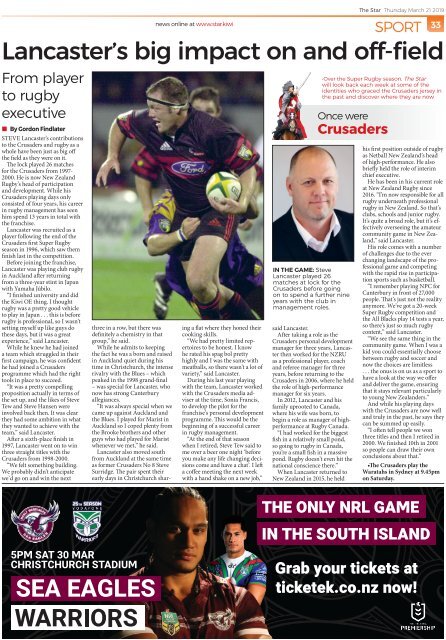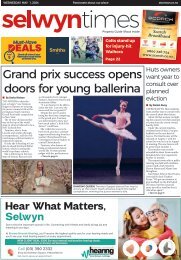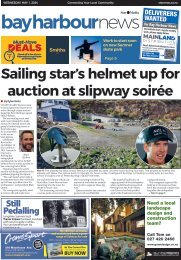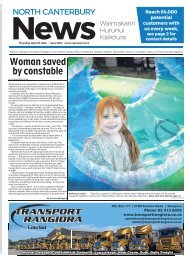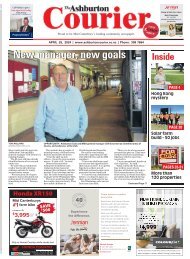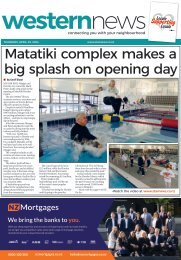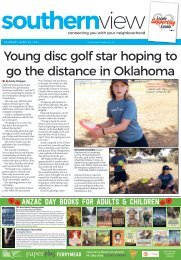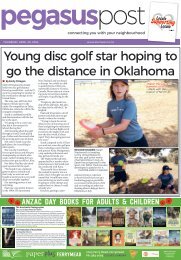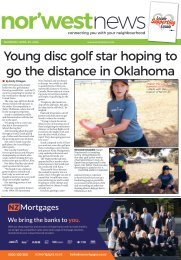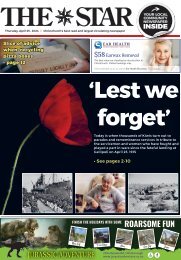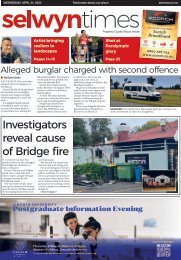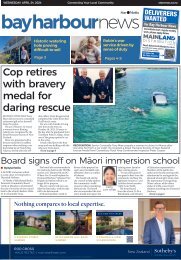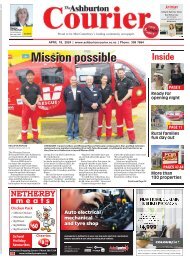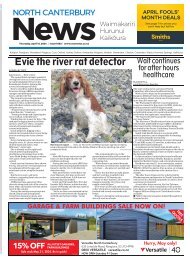The Star: March 21, 2019
You also want an ePaper? Increase the reach of your titles
YUMPU automatically turns print PDFs into web optimized ePapers that Google loves.
<strong>The</strong> <strong>Star</strong> Thursday <strong>March</strong> <strong>21</strong> <strong>2019</strong><br />
news online at www.star.kiwi<br />
SPORT 33<br />
Lancaster’s big impact on and off-field<br />
From player<br />
to rugby<br />
executive<br />
•Over the Super Rugby season, <strong>The</strong> <strong>Star</strong><br />
will look back each week at some of the<br />
identities who graced the Crusaders jersey in<br />
the past and discover where they are now<br />
• By Gordon Findlater<br />
STEVE Lancaster’s contributions<br />
to the Crusaders and rugby as a<br />
whole have been just as big off<br />
the field as they were on it.<br />
<strong>The</strong> lock played 26 matches<br />
for the Crusaders from 1997-<br />
2000. He is now New Zealand<br />
Rugby’s head of participation<br />
and development. While his<br />
Crusaders playing days only<br />
consisted of four years, his career<br />
in rugby management has seen<br />
him spend 13 years in total with<br />
the franchise.<br />
Lancaster was recruited as a<br />
player following the end of the<br />
Crusaders first Super Rugby<br />
season in 1996, which saw them<br />
finish last in the competition.<br />
Before joining the franchise,<br />
Lancaster was playing club rugby<br />
in Auckland after returning<br />
from a three-year stint in Japan<br />
with Yamaha Júbilo.<br />
“I finished university and did<br />
the Kiwi OE thing. I thought<br />
rugby was a pretty good vehicle<br />
to play in Japan . . . this is before<br />
rugby is professional, so I wasn’t<br />
setting myself up like guys do<br />
these days, but it was a great<br />
experience,” said Lancaster.<br />
While he knew he had joined<br />
a team which struggled in their<br />
first campaign, he was confident<br />
he had joined a Crusaders<br />
programme which had the right<br />
tools in place to succeed.<br />
“It was a pretty compelling<br />
proposition actually in terms of<br />
the set up, and the likes of Steve<br />
Tew and Steve Hansen were<br />
involved back then. It was clear<br />
they had some ambition in what<br />
they wanted to achieve with the<br />
team,” said Lancaster.<br />
After a sixth-place finish in<br />
1997, Lancaster went on to win<br />
three straight titles with the<br />
Crusaders from 1998-2000.<br />
“We felt something building.<br />
We probably didn’t anticipate<br />
we’d go on and win the next<br />
three in a row, but there was<br />
definitely a chemistry in that<br />
group,” he said.<br />
While he admits to keeping<br />
the fact he was a born and raised<br />
in Auckland quiet during his<br />
time in Christchurch, the intense<br />
rivalry with the Blues – which<br />
peaked in the 1998 grand-final<br />
– was special for Lancaster, who<br />
now has strong Canterbury<br />
allegiances.<br />
“It was always special when we<br />
came up against Auckland and<br />
the Blues. I played for Marist in<br />
Auckland so I coped plenty from<br />
the Brooke brothers and other<br />
guys who had played for Marist<br />
whenever we met,” he said.<br />
Lancaster also moved south<br />
from Auckland at the same time<br />
as former Crusaders No 8 Steve<br />
Surridge. <strong>The</strong> pair spent their<br />
early days in Christchurch sharing<br />
a flat where they honed their<br />
cooking skills.<br />
“We had pretty limited repertoires<br />
to be honest. I know<br />
he rated his spag bol pretty<br />
highly and I was the same with<br />
meatballs, so there wasn’t a lot of<br />
variety,” said Lancaster.<br />
During his last year playing<br />
with the team, Lancaster worked<br />
with the Crusaders media adviser<br />
at the time, Sonia Francis,<br />
to develop the pilot for the<br />
franchise’s personal development<br />
programme. This would be the<br />
beginning of a successful career<br />
in rugby management.<br />
“At the end of that season<br />
when I retired, Steve Tew said to<br />
me over a beer one night ‘before<br />
you make any life changing decisions<br />
come and have a chat’. I left<br />
a coffee meeting the next week<br />
with a hand shake on a new job,”<br />
IN THE GAME: Steve<br />
Lancaster played 26<br />
matches at lock for the<br />
Crusaders before going<br />
on to spend a further nine<br />
years with the club in<br />
management roles.<br />
said Lancaster.<br />
After taking a role as the<br />
Crusaders personal development<br />
manager for three years, Lancaster<br />
then worked for the NZRU<br />
as a professional player, coach<br />
and referee manager for three<br />
years, before returning to the<br />
Crusaders in 2006, where he held<br />
the role of high-performance<br />
manager for six years.<br />
In 2012, Lancaster and his<br />
family uprooted to Canada,<br />
where his wife was born, to<br />
begin a role as manager of highperformance<br />
at Rugby Canada.<br />
“I had worked for the biggest<br />
fish in a relatively small pond,<br />
so going to rugby in Canada,<br />
you’re a small fish in a massive<br />
pond. Rugby doesn’t even hit the<br />
national conscience there.”<br />
When Lancaster returned to<br />
New Zealand in 2015, he held<br />
his first position outside of rugby<br />
as Netball New Zealand’s head<br />
of high-performance. He also<br />
briefly held the role of interim<br />
chief executive.<br />
He has been in his current role<br />
at New Zealand Rugby since<br />
2016. “I’m now responsible for all<br />
rugby underneath professional<br />
rugby in New Zealand. So that’s<br />
clubs, schools and junior rugby.<br />
It’s quite a broad role, but it’s effectively<br />
overseeing the amateur<br />
community game in New Zealand,”<br />
said Lancaster.<br />
His role comes with a number<br />
of challenges due to the ever<br />
changing landscape of the professional<br />
game and competing<br />
with the rapid rise in participation<br />
sports such as basketball.<br />
“I remember playing NPC for<br />
Canterbury in front of 27,000<br />
people. That’s just not the reality<br />
anymore. We’ve got a 20-week<br />
Super Rugby competition and<br />
the All Blacks play 14 tests a year,<br />
so there’s just so much rugby<br />
content,” said Lancaster.<br />
“We see the same thing in the<br />
community game. When I was a<br />
kid you could essentially choose<br />
between rugby and soccer and<br />
now the choices are limitless<br />
. . . the onus is on us as a sport to<br />
have a look at the way we offer<br />
and deliver the game, ensuring<br />
that it stays relevant particularly<br />
to young New Zealanders.”<br />
And while his playing days<br />
with the Crusaders are now well<br />
and truly in the past, he says they<br />
can be summed up easily.<br />
“I often tell people we won<br />
three titles and then I retired in<br />
2000. We finished 10th in 2001<br />
so people can draw their own<br />
conclusions about that.”<br />
•<strong>The</strong> Crusaders play the<br />
Waratahs in Sydney at 9.45pm<br />
on Saturday.<br />
THE ONLY NRL GAME<br />
IN THE SOUTH ISLAND<br />
5PM SAT 30 MAR<br />
CHRISTCHURCH STADIUM<br />
Grab your tickets at<br />
ticketek.co.nz now!


